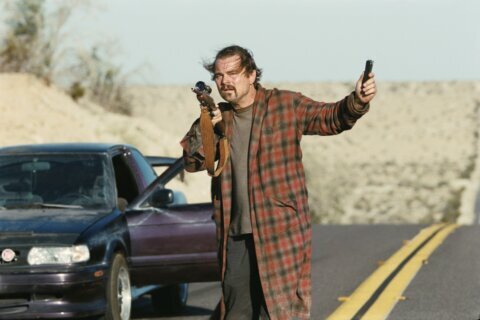Every so often, there are films by respected filmmakers that gain such buzz at film festivals that they dare critics to defy their preordained acclaimed status.
Despite filmmaker Robert Eggers’ past success in “The Witch” (2016), I can’t in my right mind recommend “The Lighthouse” for anyone looking for a Halloween date night. For all its powerful performances and haunting imagery, its setting is too bleak, its narrative too experimental, its director too indulgent, its purpose for existing too unclear.
The film follows a pair of gruff lighthouse keepers on a mysterious remote island in 1890s New England. Former lumberjack Ephraim Winslow (Robert Pattinson) arrives for a four-week stint assisting curmudgeon Thomas Wake (Willem Dafoe). As the men booze and butt heads in extreme isolation, they slowly lose their minds, imagining horrific images that ultimately drive them to violence.
Such a setup is ripe for powerful performances, and the two leads at least deliver on that front. Dafoe’s reputation precedes him, from “Platoon” (1986) to “The Last Temptation of Christ” (1988), emoting an instant danger behind his eyes. We believe he’s seen things he shouldn’t have, lending a grizzled wisdom to his cooky wickie chastising the young buck with monologues of Biblical proportions.
Pattinson is more than up to the challenge, having shaken off his Y.A. past in “Twilight” (2008) to reveal rugged chops in “The Lost City of Z” (2016). Here, it’s up to Pattinson to do the heavy lifting, showing the power shift of a young lion usurping the old. He must also convince us of the various hallucinations, his worldly eyes shifting to an ethereal gaze as he stares into the chilling abyss.
From a directing standpoint, Eggers traps both actors in an uncomfortable 4:3 aspect ratio to create a square frame for maximum claustrophobia. While such an approach works on occasion — László Nemes hid Holocaust horrors in the Hungarian “Son of Saul” (2015) — it can create a rigid viewing experience that limits peripheral mise-en-scène possibilities with an intentionally smaller canvas.
Personal taste aside, no one can argue Eggers’ moody compositions, shot in stark black and white for an austere quality like Ingmar Bergman (“Through a Glass Darkly”) or Carl Theodor Dreyer (“Ordet”). This allows for half-lit faces showing split personalities, phallic lighthouse symbolism, and trippy nightmare montages of mermaids, sea monsters and seagulls all backed by killer sound design of brooding foghorns. It all builds to horrific violence, much like “The Witch.”
This seems to be Eggers’ auteur modus operandi, showing how isolation plays tricks on the human psyche in his native New England. Yet, it’s telling that “The Lighthouse” earned the FIPRESCI Prize at Cannes, while the Palme d’Or went to Bong Jo-Hoon’s “Parasite.”
That’s because Bong has proved time and again, from “The Host” to “Snowpiercer,” a certain respect for the film spectrum of art and entertainment. Eggers leans hard to the art, thus “The Witch” has a 90 percent critics score on Rotten Tomatoes but a 58 percent audience score.
What Alfred Hitchcock did so well was to lace a riveting narrative with layers of symbolism. M. Night Shyamalan’s “The Sixth Sense” (1999) and Jordan Peele’s “Get Out” (2017) told roller-coaster surface rides with all-time great twists. Yet, they did so with layers of visual symbolism (Shyamalan’s use of red to denote the supernatural; Peele’s symbolic antlers, cotton and American flag wardrobe). These are Oscar-worthy screenplays; “The Lighthouse” is purely for directors.
The script, written by Eggers and his brother Max, is a mere excuse to shoot the imagery. It leans way too heavily on fart jokes, which are hilarious in Mel Brooks campfire comedies, but feel out of tone in a horror film. It’s a sophomoric touch to a script that lacks any real female characters, save for a sex-dream mermaid amid the drinking, brawling and masturbating. It’s one thing to be artsy, but to quote Dana Stevens of Slate, this one is quite literally “artsy fartsy.”
That may suffice in an experimental film class, but not for average folks looking for a spooky date night out. Yes, I know I’m out of step with most critics on this one. Yes, I enjoy a little entertainment with my cinesthetic techniques. And yes, it’s fully possible I’ll catch this on Turner Classic Movies in 50 years and gain a better appreciation.
But for Halloween 2019, save your money and see “Ready or Not.”









